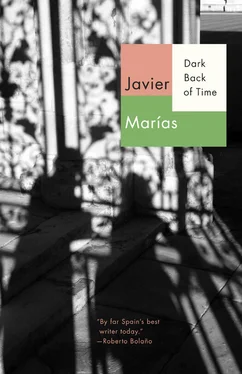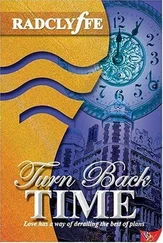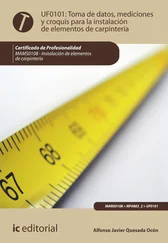He again lamented his lack of clothes. “There’s nothing to fit me in Mexico City,” he said emphatically. He told them he had called at the British Club and asked permission to have his letters addressed there. But they had given him some funny looks and the secretary’s behavior had been offensive, “Yes, if — er — your war record’s all right,” he had said. Ewart was tempted to tell him that he had had the honor of — er — commanding a company of His Majesty’s Foot Guards for a while, but forebore. “However, I’ll not darken their threshold again,” he added pompously, referring to the British Club, so suspicious and discourteous. Ewart must have been the sort of man who expects to be recognized at first glance for what he is or feels himself to be, that is, a gentleman, and who thinks his life story is visible on his face. The club’s members later regretted not having given him a warmer welcome.
They spoke of literature a while then, he and the Grahams, but the author under discussion did not lend himself to disquistions worthy of the day that it was or turned out to be, said author being none other than my exuberant compatriot Blasco Ibáñez, who had made a great impression on Ewart with the vast scope of his narratives. Ewart summarized the plots of two of Blasco Ibáñez’s novels — and Graham doesn’t seem retrospectively recriminatory over this new form of abuse, either — in which the world or half the world was the scene of the drama. Even more than the novels, Ewart had liked the movies based on The Four Horsemen of the Apocalypse and Blood and Sand , having recently seen the latter film in Santa Fe, with “the elegant Rudolf (Valentino, that is) in the role of the matador. This memory made him express the desire to go to a hundred bullfights in order to master all the subtleties of that art, though at the same time he didn’t see how he could ever go to another one, he had had such a bad time of it at his baptism in butchery.
He was delighted with his life as a writer. He could go where he liked in the world and live off his work, and there were a thousand places he wanted to go. He was to make only one more journey, as we know, an internal journey. That afternoon as they were returning to the center of the city they heard the crackle of rifle and revolver fire, the revelry was commencing.
They spent the evening at the Teatro Lírico, where they saw a revue of the year 1922, the year that was ending. They didn’t understand much, since the vignettes were full of local references, but they enjoyed the dancing and liked the scene in which a killer tried to seduce the widow of a hero until suddenly the coffin’s lid lifted and the dead man arose from the open grave to protest and forestall the crime.
Leaving the theatre they found the streets almost impenetrably crowded, overflowing with cars and trucks crammed with wide sombreros, dizzy with blaring horns and exploding fireworks and those arching, quavering, yipping cries. People carried paper flags in red, white and green, most of the men were festively brandishing shotguns or pistols — the sound of weapons going off had grown louder — and with cartridge belts slung across their chests they fired into the air from the streets and rooftops. The cafés were packed, orchestras were playing to further add to the pandemonium, the effect of pulque and other cactus-based liquors was making itself felt everywhere. The three English people felt rather tired, but still wanted supper, and they found a table in a place with music, the restaurant of the Hotel Cosmos. There they stayed for quite some time — more strawberries and cream—“and would no doubt have seen the Old Year out, the New Year in,” says Graham, “but an unkind Fate prompted otherwise.” He does not, however, explain exactly how this Fate — which doesn’t seem to have been particularly grim-faced or determined — operated, or why they were all in the street again around 11:30. He had half a mind to leave his wife at the hotel — she must have been the most exhausted of the three, having spent the whole day listening to Ewart hold forth on Blasco Ibáñez and Chihuahua dogs — and then go back to the Zócalo to contemplate the joyous midnight fusillade. But they were all done in and decided to retire to their respective hotels. Of their final discussion in the Hotel Cosmos, Graham notes only a ridiculous conversation about eggs, truly not an elevated subject for anyone’s final words, still less those of a writer who would have gone right to the top. It all started when a waiter asked the simple, innocent question, “How will you have your eggs?” which was all Ewart needed to summon forth his former expertise on poultry, perorate at length on the different classes of yolks and whites and sizes and shells, their virtues and defects, and brag of being able to state, within a 24-hour margin of error, the age of any egg — British or foreign, European or American or even African or Asiatic. “One thing I do pride myself on,” he said senselessly, “I could tell you almost to a day the age of an egg.” These can be said to have been his penultimate words. If he’d lived a day longer, he could have told whether a given egg dated from 1922 or 1923.
It seems unlikely that they spoke of nothing else throughout the entire dinner, for Ewart seems never to have been at a loss for a topic of conversation — he was a feckless chatterbox, at least on his final day, and he could always fall back on his notebook and read aloud — but strangely enough Graham does not record any other aspect of their talk. (Maybe he was dazed.) He only says that once out in the street, “we shook hands; we wished one another a happy New Year; we said good-bye . ‘ A happy New Year, and may you soon get back that iron box,’ were my last words to him, referring to that box of regimental records whose safety must, I knew, be causing him anxiety.” And Ewart answered, “Happy New Year,” and they parted. Once again Stephen Graham’s wife gives the impression of not being present, not even for the goodbye that really was goodbye. At their hotel, the Iturbide, a certain degree of chaos had set in, Graham says, with the staff “in that menacing drunken state which comes after drinking much pulque.” At midnight the clamor burst out and “hundreds of thousands of revolvers and guns must have been discharged and discharged repeatedly.” It sounded like a great general outbreak of war. Graham leaned out the window and looked at the dark sky, “which told nothing of the myriads of bullets flying into it.” Perhaps Rose Savory Graham had gone to bed with unease and foreboding, and looked at his back in silence while he gazed outside, the invisible bullets.
One of them flew a little lower or was spent or grew cold too quickly and embedded itself in the blind left eye of another man, also standing on a balcony, either wearing pyjamas or still dressed in his brand-new Mexican shirt, either standing up or sitting in an armchair, still wearing his glasses and intending to shave before going to bed in a bed that was never unmade or even turned down, a man who had changed rooms twice until he ended up in that fifth-floor room and who had not moved from one hotel to another, as had been his intention since the previous afternoon, in order to be closer to his friends, who sometimes seemed to flee from him and at other times pursued him as if they were hot on the trail of a lover or an enemy. Nothing makes sense, nothing fits, and the thing that makes the least sense of all is that Ewart and the Grahams retired to get some rest in a city and at a time in which absolutely no one was going to be able to rest or sleep until dawn or thereafter. Perhaps his death was a belated intrusion of the all-out warfare that was sidestepped before his eyes one Christmas morning in a remote Flemish quagmire. Perhaps it was the counterpart of that truce of ten or twenty joyous and unified minutes out of the prolonged destruction of months; now it was his turn to be annihilated amid a great, peacetime revelry, as it had been the turn, seven years earlier, of a sergeant named Oliver to be struck down as a reminder of war — or was it war’s revenge — during the brief duration of the truce and not before or after, his poor, trusting figure much loved by his comrades-in-arms. “It makes no difference. It must be an accident,” wrote Ewart, and the ceasefire was not interrupted for that reason just as the boisterous festivities in Mexico City were not interrupted because he lay the whole night on the balcony or the floor of the room with a hole in his eye, his face not even covered by half a sandbag or a blanket, while Stephen Graham turned back to his wife and, after closing the window to mute the uproar of the general outbreak of war, walked to the bed, perhaps toward her arms reaching out to him, begging for protection, demanding love.
Читать дальше












